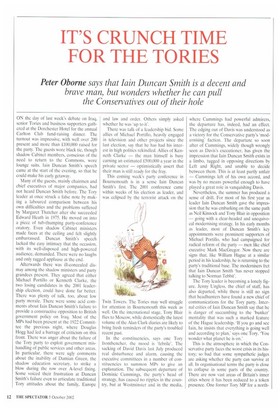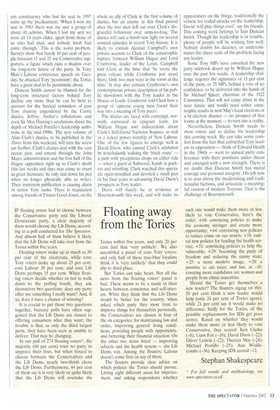IT'S CRUNCH TIME FOR THE TORIES
Peter °borne says that lain Duncan Smith is a decent and
brave man, but wonders whether he can pull the Conservatives out of their hole
ON the day of last week's debate on Iraq, senior Tories and business supporters gathered at the Dorchester Hotel for the annual Carlton Club fund-raising dinner. The turnout was impressive, with well over 200 present and more than £100,000 raised for the party. The guests wore black tie, though shadow Cabinet members, conscious of the need to return to the Commons, wore lounge suits. lain Duncan Smith's speech came at the start of the evening, so that he could make his early getaway.
Many of the guests, mainly chairmen and chief executives of major companies, had not heard Duncan Smith before. The Tory leader at once struck a false note by making a laboured comparison between his own difficulties and the problems suffered by Margaret Thatcher after she succeeded Edward Heath in 1975. He moved on into a piece of tub-thumping party-conference oratory. Even shadow Cabinet ministers made faces at the ceiling and felt slightly embarrassed. Duncan Smith's speech lacked the easy intimacy that the occasion, with its well-disposed and high-powered audience, demanded. There were no laughs and only ragged applause at the end.
Afterwards there was ill-concealed dismay among the shadow ministers and party grandees present. They agreed that either Michael Portillo or Kenneth Clarke. the two losing candidates in the 2001 leadership election, could have done far better. There was plenty of talk, too, about low party morale. There were some acid comments about lain Duncan Smith's failure to provide a constructive opposition to British government policy on Iraq. Most of the MPs had been present at the 1922 Committee the previous night, where Douglas Hogg had led a barrage of criticism on this front. There was anger about the failure of the Tory party to exploit government mishandling of public services and other areas. In particular, there were ugly comments about the inability of Damian Green, the shadow education secretary, to strike a blow during the row over A-level fixing. Some voiced their frustration at Duncan Smith's failure even to articulate traditional Tory attitudes about the family, Europe and law and order. Others simply asked whether he was 'up to it'.
There was talk of a leadership bid. Some allies of Michael Portillo, heavily engaged in television and other projects since the last election, say that he has had his interest in high politics rekindled. Allies of Kenneth Clarke — the man himself is busy earning an estimated £500,000 a year in the private sector — optimistically assert that their man is still ready for the fray.
This coming week's party conference in Bournemouth is in a sense lain Duncan Smith's first. The 2001 conference came within weeks of his election as leader, and was eclipsed by the terrorist attack on the Twin Towers. The Tories may well struggle for attention in Bournemouth this week as well. On the international stage, Tony Blair flies to Moscow, while domestically the latest volume of the Alan Clark diaries are likely to bring fresh reminders of the party's troubled recent past.
In the constituencies, says one Tory frontbencher, the mood is 'febrile'. The sacking of David Davis last July produced real disturbance and alarm, causing the executive committees in a number of constituencies to summon MPs to give an explanation. The subsequent departure of Dominic Cummings, the party's head of strategy, has caused no ripples in the country, but at Westminster and in the media,
where Cummings had powerful admirers, the departure has, indeed, had an effect. The edging out of Davis was understood as a victory for the Conservative party's 'modernising' faction. The departure so soon after of Cummings, widely though wrongly seen as Davis's executioner, has given the impression that lain Duncan Smith exists in a limbo, tugged in opposing directions by Left and Right, and unable to decide between them. This is at least partly unfair — Cummings left of his own accord, and was by no means powerful enough to have played a great role in vanquishing Davis.
Nevertheless, the summer has produced a sense of drift. For most of his first year as leader lain Duncan Smith gave the impression that he was embarking on the same path as Neil Kinnock and Tony Blair in opposition — going with a clear-headed and unequivocal modernising strategy. In his early months as leader, most of Duncan Smith's key appointments were prominent supporters of Michael Portillo, who had campaigned for radical reform of the party — men like chief executive Mark MacGregor. Now there are signs that. like William Hague at a similar period in his leadership, he is returning to the party's traditional base. The modernisers fret that lain Duncan Smith 'has never stopped talking to Norman Tebbie.
The Tory leader is becoming a lonely figure. Jenny Ungless, the chief of staff, has also departed, while there is still no sign that headhunters have found a new chief of communications for the Tory party. Internal critics of lain Duncan Smith say that he is danger of succumbing to the 'bunker' mentality that was such a marked feature of the Hague leadership. 'If you go and see lain, he insists that everything is going well and according to plan,' says one Tory. 'You wonder what planet he is on.'
This is the atmosphere in which the Conservative party faces the worst crisis in its history; so bad that some sympathetic judges are asking whether the party can survive at all. In organisational terms the party is close to collapse in some parts of the country. There are now vast areas of Britain's inner cities where it has been reduced to a token presence. One former Tory MP for a north em constituency who lost his seat in 1997 sums up the predicament: 'When I won my seat in 1983 there was me and a group of about 40 activists. When I lost my seat we were all 14 years older, apart from those of us who had died, and nobody fresh had come through.' This is the worst problem. Surveys show that barely 10 per cent of people between 15 and 25 are Conservative supporters, a figure which casts a shadow over the long-term future of the party. In Tony Blair's Labour conference speech on Tuesday, he attacked Tory 'pessimism': the Tories have a great deal to be pessimistic about.
Duncan Smith cannot be blamed for the long-term structural factors behind Tory decline any more than he can be held to account for the farcical reminders of past Tory disarray engendered by the Currie diaries, Jeffrey Archer's tribulations and even Sir Max Hasting's revelations about the depth of Michael Portillo's leadership ambitions in the mid-1990s. The new volume of Alan Clark's diaries, to be published in the Times from this weekend, will turn the screw yet further. Clark's diaries deal with the very recent past, and extend through the John Major administration and the first half of the Hague opposition right up to Clark's death (his last weeks and days may come to count as great literature: he only laid down his pen when no longer physically able to write). Their imminent publication is causing alarm in senior Tory ranks. There is trepidation among friends of Tristan Garel-Jones, on the
whole an ally of Clark in the first volume of diaries, but an enemy in this final period after the two men fell out over Clark's disgraceful behaviour over arms-to-Iraq. The diaries will cast a harsh new light on several seminal episodes in recent Toryhistory. It is likely to contain Alastair Campbell's own private account to Clark of the catastrophic rupture between William Hague and Lord Cranborne, leader of the Lords. Campbell told Clark at the time that 'he wrote the press release while Cranborne just stood there. Only two men were in the room at the time.' It may also contain Cranbome's own contemptuous private description of his public showdown with the Tory leader in the House of Lords. Cranborne told Clark how a group of 'epicene young men found their way into a meeting of Tory peers'.
The diaries are laced with contempt, normally expressed in epigram form. for William Hague and indiscretions about Clark's half-friend Nicholas Soames. as well as a naked power worship of New Labour. One of the few figures to emerge well is David Davis, who earned Clark's adulation by nonchalantly walking the 'black route' — a path with precipitous drops on either side — when a guest at Saltwood, hands in pockets and whistling. Clark watched this spectacle open-mouthed and devoted a small part of his final years to advancing David Davis's prospects as Tory leader.
Davis will barely be in evidence at Bournemouth this week, and will make no appearances on the fringe, traditionally the vehicle for coded attacks on the leadership. David 'will play things cool', say his friends. This coming week belongs to lain Duncan Smith. Though his leadership is in trouble, plenty of people will be wishing him well. Nobody doubts his decency, or underestimates the sheer scale of the problem facing any leader.
Some Tory MPs have consulted the new party rulebook drawn up by William Hague over the past few weeks. A leadership challenge requires the signatures of 15 per cent of the party, or 25 MPs, behind a vote of no confidence, to be delivered into the hands of Sir Michael Spicer, chairman of the 1922 Committee. That will not come about in the near future and would need either catastrophic results in next May's local elections or a by-election disaster — no prospect of that looms at the moment — to turn into a reality.
Nevertheless, Duncan Smith needs to show vision and to define his leadership this coming week. He can take some comfort from the fact that embattled Tory leaders in opposition — think of Edward Heath in the 1960s — went to annual party conferences with their positions under threat and emerged with a new strength. There is no doubt that Duncan Smith has moral courage and personal integrity. His job now is to soar above the modernising and traditionalist factions, and articulate a meaningful version of modern Toryism. That is the challenge of Bournemouth.





































































 Previous page
Previous page